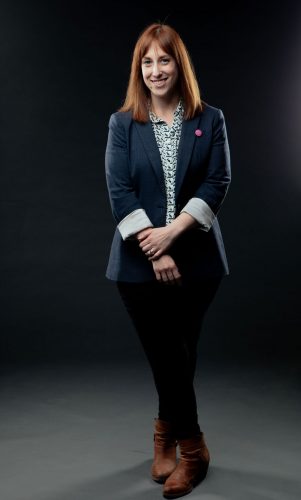
“Aw, shit!”
Those were the words Martina Shabram remembers her history teacher Alex Angell saying after she began explaining why she stopped showing up for his class during her junior year at Berkeley High School.
Angell’s swearing shocked her because, she says, he was treating her like an actual person.
Shabram enrolled in an alternative high school program, worked full time and, as a result, graduated on time despite dropping out during her junior year. She went on to go to college and finished a Ph.D. in English literature at the age of 27.
She says it’s an accomplishment that should be credited to Angell, not her.
This, then, is the story of a teacher who was able to see a student in crisis and who had the resources to direct her to eventual success within the education system. Shabram says she’s running for the Eugene School District 4J Board of Directors to help set up a network within the community to ensure students don’t fall through the cracks of the local school district.
Shabram now works for Planned Parenthood of Southwestern Oregon as a community health educator and coordinator with the nonprofit’s REV Youth Leadership Program. She is running against incumbent and former Eugene mayor Jim Torrey for position 5 on the 4J board. Shabram says she’s not running against Torrey — she’s running for the students.
“What I bring is really unique,” she says. “Part of it is the decade I’ve served as an educator.”
She says she’s taught in more than half of all 4J schools — an experience that only some substitute teachers and a few parents have had. It’s given her insight into the similar struggles that schools face: infrastructure issues or program difficulties.
Both school unions, Eugene Education Association and Oregon School Employees Association, have endorsed Shabram. She says these endorsements prove her commitment to listening to teachers and district staff.
Such in-class experience is something missing from the current board, she says, because serving on the board often means sacrificing time — a scarcity for many. The school board meets every first and third Wednesday of each month, with some additional work sessions when needed.
Because serving on the school board is a volunteer position, a certain demographic tends to be more represented, she says: people who are in a more comfortable place in their career, which allows them to take time away from the office. Some board members are retired.
Shabram says she wants to serve on the 4J board as a way to offer a more diverse perspective.
In fact, when she attended her first school board meeting, the lack of childcare struck her.
“How are parents, community members, educators — whomever — supposed to access that space if they have children?” she says.
Shabram’s dedication to empowering youth is obvious when she walks into the Eugene Weekly with her campaign manager, Connor Gabor — an 18-year-old South Eugene High School student who’s also the founder and chair of the Young Democrats of Lane County.
Gabor says students approached Shabram to run for the school board seat because she’s spent the past few years teaching students about consent and sexual assault prevention.
“We’re in the age of #MeToo, and we should not be allowing children to be sexually assaulted in schools,” he says. “That’s a huge ethical failure of all leaders in 4J.”
Shabram says that what she’s learned from leading the REV program is to sit back and listen to what youth have to say.
“The whole model of REV comes from understanding young people are the experts of their own experience,” she says. “When adults pretend what they know is best for kids, all we do is push kids away from us.”
In her current position, Shabram says, she does develop lesson plans and curricula, but listening is probably the biggest part of her education model.
“When we adults can be humble enough and shut up and listen to them, we really gain a lot,” she adds.
Other unions, such as United Food and Commercial Workers Local 555 and International Brotherhood of Electrical Workers 280, have come out in support of Shabram. So it’s no surprise she speaks out in favor of using a community benefits agreement (CBA) for future capital projects.
A CBA is a contract signed, in this case, by a government agency and a contractor to ensure a project not only pays prevailing wage but can also offer health insurance and has an inclusive workforce.
For Shabram, it’s a way to support working families in the Eugene area.
“The people who are building those schools have kids who are going to those schools. The kids who are going to those schools would benefit greatly from dental insurance,” she says.
“If we’re employing their parents to build the school they’re going to go to, we have to then provide the parents with the resources they need,” Shabram adds.
And there’s the issue of the tale of two Eugenes — south and north.
When the school board was worried about the bond amount last year, which could have affected the capacity of North Eugene High School, the board meeting started with the announcement that South Eugene High School had been named the best high school in Oregon.
And a 2017 media bias study based on coverage by The Register-Guard shows that local education stories are often complimentary about South Eugene schools but negative when it comes to other schools.
Shabram says an important — but easy — step is to change the rhetoric of the two areas and to celebrate achievements of all schools.
“I think there’s a lot to be said for celebrating the real amazing things that are going on in all those schools and lifting those up and really making sure we speak as a whole community about every one of our schools,” she says. “And that is about perception, but perception matters a lot.”